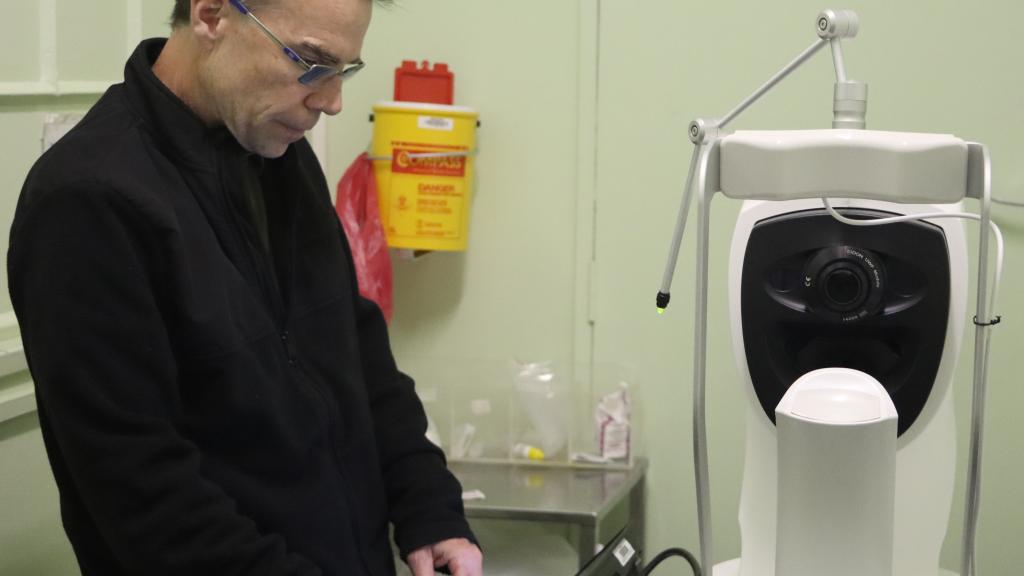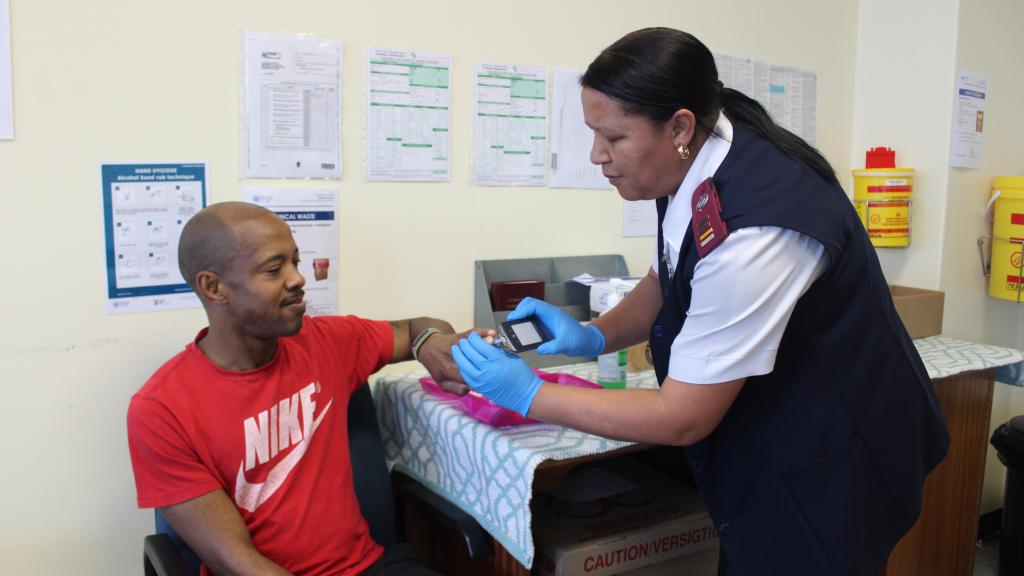Reducing diabetes complications: Why early detection, treatment and education are essential
Angelo Plaatjies was just five years old when he was diagnosed with type 1 diabetes. Now 33, he has navigated a lifetime of managing his condition, learning how to balance his health and well-being. Diabetes is a chronic condition that affects how the body turns food into energy.
“Living with diabetes hasn’t been easy, especially when I was invited to children’s parties as a child,” Angelo, a patient at Tygerberg Hospital, recalled. “There were always sugary treats, and I had cravings, especially for the sweet stuff,” he added Angelo says with the right care and support from healthcare workers and his family, he has learned how to manage his condition and live his life fully.
His journey highlights the importance of early detection, treatment and education of diabetes - key services offered at our specialised diabetes at Red Cross War Memorial Children’s Hospital (RCWMCH), Groote Schuur Hospital (GSH) and Tygerberg Hospital (TBH). Patients with diabetes complications are referred to our tertiary facilities for treatment. However, lifestyle changes can make a powerful difference in managing and even preventing the disease. It is never too late to begin making healthier choices, and support is available to you every step of the way.
Premier Alan Winde, himself a diabetic, has urged residents living with the condition to adopt a healthier lifestyle, “It is a manageable condition, and one can live a perfectly normal life if you take the necessary steps to keep it under control. At first this may be difficult, but it will eventually come naturally to you. I exercise as often as I can and eat a balanced diet. Equally as important is the support my family and friends gives me and I also always follow the advice of my doctor, this is crucial. And you must always remember, you are not alone; there is always help available.”
This year’s World Diabetes Day (14 November) theme, Breaking Barriers, Bridging Gaps, highlights the importance of improving access to quality healthcare.
Diabetes happens in children: Know the signs
At RCWMCH, patients like Angelo are supported from the moment they are diagnosed, with dedicated teams focused on not just medical treatment, but also patient and family education.
The hospital sees around 3 - 5 newly diagnosed patients per month in its diabetes ward following referrals to the facility. After admission, young diabetes patients will receive follow-up appointments to visit the diabetes clinic at the hospital. Most children present with type 1 diabetes, often in a critical condition.
Dr Michelle Carrihill, a paediatric endocrinologist and lead of the diabetes and endocrinology department at the hospital, explained, “According to our registry, over the last six years, we have averaged around 50 new patients per year. However, this number can vary significantly, with as few as three or as many as 12 new cases in a single month. Our primary concern is that many young patients with diabetes arrive very sick, sometimes requiring ICU admission, which can be traumatic for both the children and their families.”
Dr Carrihill stressed the importance of recognising the warning signs of diabetes in children and seeking urgent help from a clinic.
Common symptoms include:
- Sudden bedwetting or frequent urination
- Increased thirst
- Weight loss or not picking up weight
- Difficulty concentrating at school
- Vision problems
- Vomiting
“If your child exhibits any of these symptoms, please access your clinic for a test. If you can make a diagnosis before they become very sick, they will be much better off. Early detection is crucial in preventing severe illness. Our patients don’t need to be very sick when they’re in the ward. They can be newly diagnosed, and it allows for our team to provide education and counselling to the patient and their family,” said Dr Carrihill.
The hospital also provides care to children presenting with type 2 diabetes. “Obesity is a concern in children and children can develop type 2 diabetes. We are seeing more type 1 diabetic children presenting earlier because they’re overweight or obese and need more insulin, which their pancreas can’t produce. Some of our patients are as young as six or seven years old. About 10% of our patients present with type 2 diabetes. We are also seeing cases of ‘double diabetes’, where children have both type 1 and type 2 diabetes,” Dr Carrihill stated.
One of the most important factors in reducing the risk of childhood diabetes, health experts agree, is early detection, treatment and education. “Type 1 diabetes is autoimmune with a genetic risk and is not preventable at this stage. It’s important to understand that it doesn’t happen because anyone did anything wrong.”
She added, “Prevention begins in utero with healthy pregnant mothers. Antenatal care should include education on healthy eating, which continues with healthy feeding and breastfeeding after birth which can reduce the risk of diabetes. Families need to be educated on nutritious meals and the dangers of processed foods, starting in schools and extending beyond.”
Similarly, Tygerberg Hospital offers a comprehensive service to children and adults at its diabetes clinics. Dr Marli Conradie-Smit, head of Endocrinology, shares, “Our adult diabetes clinics treat between 109 (Type 1) to 190 (Type 2,) patients per month, with 5-6 new cases each week. These clinics aim to enhance the care of people living with diabetes. Patients have access to a specialised team focused on patient-centered care in diabetes mellitus. Often, we evaluate patients and then refer them back to their local clinic with a clear care plan. Additionally, we have access to specific medications, like insulin analogues, that only specialists can initiate. Patients are also educated to manage diabetes mellitus effectively, live well, and stay active in their communities.”
Knowing the risks of diabetes in adults
In adults, the most common type of diabetes is type 2, which occurs when the body becomes resistant to insulin or does not produce enough insulin, according to the World Health Organisation. Type 2 diabetes can lead to long-term damage to your body, so an early diagnosis is crucial. Untreated or badly controlled diabetes can result in amputations, kidney failure and blindness.
Groote Schuur Hospital conducted 456 retinal operations between January 2023 and June 2024, of which 256 (57%) involved diabetic eye problems. At this advanced stage of the disease, the diabetic retinopathy is theoretically preventable with primary and secondary prevention strategies.
“Eye screening is an important part of managing your condition, regardless of the type of diabetes you have. As diabetic retinopathy does not show any symptoms in the early stages when they are most treatable, it can become quite advanced before you start to notice it. Going to your routine eye screening at a clinic can help you spot and treat diabetic retinopathy early, which should prevent it from progressing to a stage when it is more difficult to treat,” said Dr James Rice, head of the Eye Department’s retina service at Groote Schuur Hospital.
After diagnosing an eye condition, an eye doctor at a referral tertiary hospital may recommend more regular eye exams and suggest changes to an individual’s diabetes management plan. In some cases, ophthalmologists may treat these conditions with medication, laser treatments, surgery, or a combination of these treatments.
Take action against diabetes today
Healthcare professionals agree that diabetes can be managed, and its complications can be avoided or delayed with the right approach. This includes a balanced diet, regular physical activity, appropriate medication, and consistent screening and treatment. If you suspect that you or a loved one may have diabetes, don’t wait to get help. Your health is worth it!




